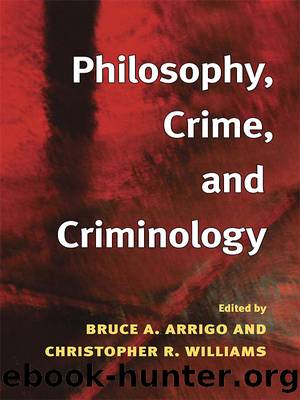Philosophy, Crime, and Criminology by Bruce A. Arrigo Christopher R. Williams

Author:Bruce A. Arrigo, Christopher R. Williams [Bruce A. Arrigo, Christopher R. Williams]
Language: eng
Format: epub
ISBN: 9780252072895
Barnesnoble:
Publisher: University of Illinois Press
Published: 2006-01-02T00:00:00+00:00
PART THREE
Ethics and Crime
Discussions of ethics entail a deliberate engagement with the thorny, contentious, and timeless debates surrounding the nature of freedom and responsibility, being and becoming, personhood and citizenship. Accordingly, ethical inquiry pursues the meaning of living virtuously and acting morally in an organic, complex society. In relation to the philosophical foundations of crime, ethical inquiry investigates how nonnormative expressions of reason, desire, choice, and conduct are fundamental, rather than peripheral, to being fully human.
Chapter 5 examines the possibility of an ethics of crime or, more generally, an ethics that gives rise to criminal or non-normative conduct understood as an ethics of freedom. Freedom is conceptualized as a core value, motivation, and commitment for individuals who pursue nonnormative behavior in light of their lived experiences. The relationship between ethics and human existence is examined, the possibility that freedom itself can be an ethic is addressed, and a framework from within which to understand kinds of freedom, kinds of human motivations linked to freedom, and kinds of human behaviors motivated by freedom are described. The proposed framework offers freedom a threefold role in human motivation, valuation, and behavior, namely (1) freedom experienced in the form on non-normative choice, (2) freedom experienced in acts of nonnormativity, and (3) freedom experienced as a (potential) consequence of nonnormativity. This threefold framework yields three corresponding types of ethics: the ethics of the underground, the ethics of play, and the ethics of transformation.
Building upon this notion of crime or nonnormative conduct as a manifestation of âtypesâ of freedom, chapter 6 first develops Deleuzeâs ethics integrated from Nietzsche and Spinoza. The notions of will to power and forces as well as deterritorialization are summarized. The chapter then applies these concepts to justice studies and the emerging interests in the âedgeworker.â In studying Deleuzeâs notion of evaluation, chapter 6 incorporates a constitutive approach in defining harm. The final section engages in a dialogue with Williamsâs three ethics of freedom. It indicates some points of convergence as well as divergence.
Perhaps what is most provocative about the chapters in this section is how the authors endeavor to humanize the so-called offender by de-realizing the personâs otherwise criminal motivations, choices, and actions. In other words, philosophical inquiry permits one to speculate on how the need for self-expression (e.g., experiencing increasing degrees of freedom through thrill seeking, nonnormative conduct, or choice making) represents a core constituent of human becoming. Thus, the ethical dimensions of our existenceâand by extension the philosophical foundations of crimeâcannot be understood absent a careful and systematic assessment of this underexamined phenomenon.
Download
This site does not store any files on its server. We only index and link to content provided by other sites. Please contact the content providers to delete copyright contents if any and email us, we'll remove relevant links or contents immediately.
Machine Learning at Scale with H2O by Gregory Keys | David Whiting(4293)
Killers of the Flower Moon by David Grann(4039)
Oathbringer (The Stormlight Archive, Book 3) by Brandon Sanderson(3157)
Will by Will Smith(2910)
Once Upon a Broken Heart by Stephanie Garber(2847)
Guns, Germs and Steel by Diamond Jared(2365)
It Starts With Us (It Ends with Us #2) by Colleen Hoover(2343)
Borders by unknow(2303)
Friends, Lovers, and the Big Terrible Thing by Matthew Perry(2219)
The Room Where It Happened by John Bolton;(2151)
The Color of Law by Richard Rothstein(1936)
A Short History of War by Jeremy Black(1842)
The Strength In Our Scars by Bianca Sparacino(1841)
HBR's 10 Must Reads 2022 by Harvard Business Review(1839)
A Game of Thrones (The Illustrated Edition) by George R. R. Martin(1722)
Water Rights and the Environment in the United States by John Burch(1679)
515945210 by Unknown(1660)
Examples & Explanations: Administrative Law by William F. Funk & Richard H. Seamon(1642)
That Every Man Be Armed by Stephen P. Halbrook(1578)
